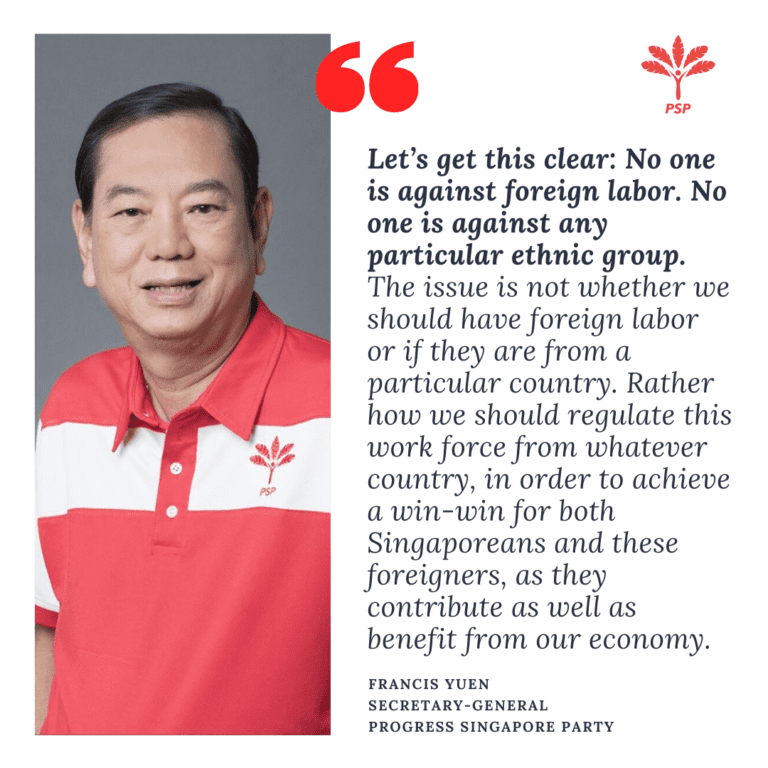Statement from the Secretary-General of PSP, Francis Yuen:
It is disappointing to read MOM’s statement on foreign labour as carried by the Straits Times today (19-May-2021). It completely fails to address the desire and call of many Singaporeans, which is not to close our borders to other countries, but only to temporarily close our door to the risk of highly transmissible Covid-19 mutated strains. Workers from various other countries without such high risk should then supplement our foreign work force. The call to temporarily close our borders to such high-risk countries was only made in the last two months and NOT last June.
All of us understand the need for foreign labour. But it is an opportune time to think out-of-the-box and be creative so as to lessen our dependence on foreign labour. The new normal will no longer be to grow our economy through low-cost labour, it is just not sustainable. It is a reality that we have to recognise and come to terms with, the sooner the better!
Instead of just looking at the supply end of the equation, we need to seriously look at the demand side to identify solutions.
Take the construction industry as an example, since it employs a large number of foreign workers. Instead of being fixated with the need of having the approximate 300,000 foreign workers to support it, can we not think of ways to reduce this number to achieve the same objective?
One way is to look at standardizing the design of HDB apartments to allow for more prefabrication instead of building in-situ. Standard design allows for economies of scale in prefabrication methods which allow for automation and driving up productivity and use of higher-skilled labor which may attract more locals to participate in this industry. Granted that there will be constraints in moving towards a different paradigm, but transforming from labour intensive paradigm to skill intensive paradigm is not an option but an imperative now.
The same can be said about other labour intensive areas like cleaning, where use of automation reduces the need for manual work and increases productivity. We can take a leaf from how Japan does it. A holistic approach includes public education and encouraging the individual’s willing participation instead of the blunt use of punitive enforcement, for example imposing fines as penalties for failure to return trays at hawker centres.
Another aspect to this fixation to keep up with import of foreign labour is the timeline for pipeline projects. Isn’t it prudent to review the urgency of many of these projects? The demand can certainly be geared downwards if we are prepared to have some hard tradeoffs in this challenging environment. It’s a question of what constitutes essential and urgent projects versus those that can wait, a case of ‘tyranny of the urgent’.
So while it is absolutely reasonable to call for temporary border closure to control import of labour from high-risk countries to protect public health and safety of our people, the longer term problem of over reliance on such foreign labour must be tackled now in earnest and with urgency.
In this discourse, labelling or sweeping generalisation of Singaporeans who express genuine concern of the over-reliance on foreign labour especially from high-risk countries as xenophobic or racist is uncalled for, unfair and even dangerous.
Let’s get this clear: No one is against foreign labour. No one is against any particular ethnic group. The issue is not whether we should have foreign labour or if they are from a particular country. Rather how we should regulate this work force from whatever country, in order to achieve a win-win for both Singaporeans and these foreigners, as they contribute as well as benefit from our economy.

